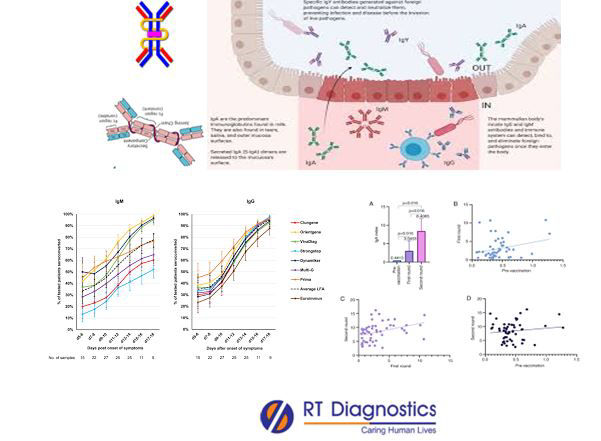Immunoglobulin IgA:
Why Immunoglobulin IgA Test ?
CLINICAL INFORMATION
The immune system together with T Cell, B Cell and Antibodies form an important part of adaptive immunity. Immunoglobulins are produced by immunoglobulin genes by V(D)J rearrangement or recombination.
Immunoglobulins are glycoprotein molecules (glycoproteins belong to the immunoglobulin superfamily) also known as antibodies (Ab) that are produced by the WBCs – i.e B Cells (Plasma Cells). Immunoglobulins (Ig) are proteins (soluble “Y – shaped” proteins) synthesized by the body’s immune system in response to invading infectious foreign pathogens such as bacteria, viruses, fungi, parasites, allergens etc. Sometimes allergies can trigger an overactive immune response (Exaggerated Hypersensitive Reaction–eg. Anaphylaxis). Hence antibody-mediated immunity is otherwise known as Humoral Immunity. Antibody contains a paratope (analogous to a lock) that binds to the antigenic determinant known as the epitome of the foreign antigen present in the invading pathogen. The binding together of the paratope to the epitope is precise. Hence the screening of (those specific) antibody test helps in the diagnosis of many suspected infections in the body eg. COVID-19 etc. There are iso-types of antibodies i.e different antibody classes – such as IgA, IgG, IgM, IgE, IgD etc. The function of antibodies includes neutralization, agglutination, phagocytosis, complement activation, regulates other immune cells eg. Up-regulation (stimulating an immune response) or down-regulation, providing passive immunity eg. to the fetus and to the newborns via breast milk etc. Immunoglobulin test is indicated in conditions such as unexplained weight loss, chronic diarrhoea, unexplained fever (i.e fever of unknown origin), skin rashes, allergies, multiple myloma, HIV, AIDS, certain cancers etc. Low levels of immunoglobulins may be caused by steroid therapy, complications of Diabetes mellitus, immuno-compromised patients, liver or kidney diseases and/or failure etc. Higher levels of immunoglobulins may be triggered by chronic infections, allergies (hypersensitive reactions), IBD, autoimmune disorders – rheumatoid arthritis, lupus, celiac disease etc, certain cancers such as leukaemia, lymphoma, multiple myloma etc. Immunoglobulin A (IgA) is found in the respiratory tract, digestive tract, reproductive tract etc. Their levels increase during any infection associated with these systems. Other tests include CBC, urine test, allergen tests, LFT, IBD, electrophoresis tests, and urine test (to confirm BenceJones protein – i.e to detect the light chains in case of multiple myloma).

General Instructions:
Sample Requirement: Specimen - Blood sample collected from the vein. Test Preparation: None.
NOTE - Sample for specimen collections may vary based on the patient’s condition/cases according to the patient’s presenting complaints/signs or symptoms:
SPECIMEN REQUIREMENT (Special or Rare Cases) - As instructed and guided by Physician / Clinician / Pathologist / as per Laboratory’s requirements, according to procedures and protocols.
This Multi-Specialty Clinical Referral Laboratory RT DIAGNOSTICS provides precise and accurate tests with an extensive range of testing services to the medical centres to help in the diagnosis and identification of pathology in the test specimens for infectious diseases and also to evaluate the function of organ systems of the patient. It prevents further complications and helps to stabilize and restore health to near normalcy at the earliest without delay.



